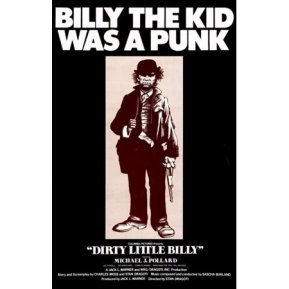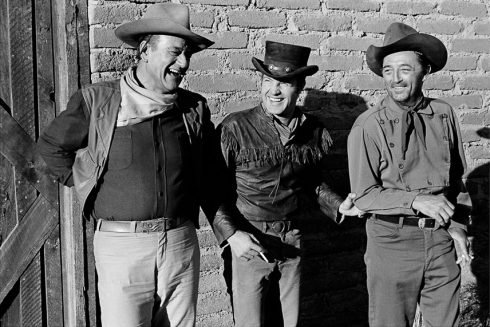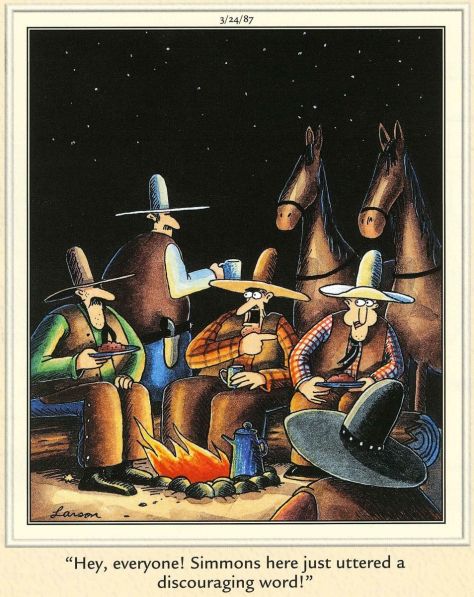Monthly Archives: September 2020
Sunday Funnies – 14
A little Fall renovating
In case anyone is confused by the different layout and some things being way out of order, fret not, I’m trying a different layout and it’s taking a little time to get everything arranged properly.
In the meantime,…might I suggest a humorous bit of whimsy from the Far Side cartoons on display in the Sunday Funnies dropdown?
The Revisionist Era of Westerns
The Revisionist Era may not have had an official start date, but it was basically when Hollywood started reassessing the way it looked at westerns. Traditionally, we knew who the good guy was, we knew what he was fighting for, and we knew he was going to win. Eventually the formula ran cold and we started getting stories where we didn’t know who was the good guy, or who was going to win; revenge became a driving motivator, replacing the good-ol’ pursuit of justice.
 Out of this movement we got leads who were more and more jaded, who handled women however they wanted, and at it’s pinnacle we saw the most revered names of the gunfighter era dragged through the mud in attempt to “take the shine off”, as so many like to brag about when approaching the old west. Examples are “Doc” and “Dirty Little Billy”; each a blatant rewrite of history, intentionally skewed in order to serve a purpose of this “new vision” that satisfied the mood of the time. Which, of course, I would be remiss if I didn’t mention the political overtones of the films that tied to the political activities of the country at that point in the countries history. I have no interest in getting into the politics of these movies, but it is an unavoidable part of this revisionist era of westerns. Another major aspect of the revisionist time was the Spaghetti Western. These films perfected the grizzled, S.O.B as lead character.
Out of this movement we got leads who were more and more jaded, who handled women however they wanted, and at it’s pinnacle we saw the most revered names of the gunfighter era dragged through the mud in attempt to “take the shine off”, as so many like to brag about when approaching the old west. Examples are “Doc” and “Dirty Little Billy”; each a blatant rewrite of history, intentionally skewed in order to serve a purpose of this “new vision” that satisfied the mood of the time. Which, of course, I would be remiss if I didn’t mention the political overtones of the films that tied to the political activities of the country at that point in the countries history. I have no interest in getting into the politics of these movies, but it is an unavoidable part of this revisionist era of westerns. Another major aspect of the revisionist time was the Spaghetti Western. These films perfected the grizzled, S.O.B as lead character.
This era was, for the most part, initiated in the 60’s, peaking in the 70’s, and continuing into the 80’s. By film school standards even today’s movies are widely considered revisionist simply because they weren’t the classic good-guy formula of the oaters era. And for the purposes of this site, I separate the movies with the release of Young Guns in 1988. Most everything from Young Guns forward will be classified in the “Modern Era”, but that’s explained on it’s own page.
The Revisionist Era brought about many other nuanced labels such as modernist westerns, deconstructionist westerns, anti-westerns, and even acid westerns and red westerns. I have no interest in diving into the dynamics that separate each of these labels, or what makes them worthwhile; I’m only interested in if it’s a western or not. The intent of this blog is not to be a college course on western film, it’s a simple place to have fun with men wearing guns and riding horses.
In 1961 Marlon Brando’s movie One-Eyed Jacks was released, and this film is widely considered the start of the revisionist era. This was because, as was referenced just a moment ago, the lines of good and bad were not easily identified. While this was truly a different perspective for the western genre, it’s created a bit of a problem. Sixty years later pretty much every western that comes out is classed as a revisionist western. If 60 years of westerns all deserve to be labeled revisionist, then what does revisionist even mean anymore?
If we’re being honest then we should acknowledge that “revisionist“ meant using the western as allegory for contemporary climates. Westerns can always, and often do, reflect the attitudes and morals of our country; it is practically what they are made for. But 1993’s Tombstone, and 1971’s Doc do not belong in the same sub-category of western. They just aren’t the same type of film at all, primarily using the directors intent as our gauge.
I think we see a definite turn in the mid-to-late 80’s in regards to how westerns were being presented, and this was due to a decline in the revisionist tones that were so prevalent in the previous decade, and I’d like to see a new term being applied to the movies that came later in response to this shift.
Here’s how I see it:
–>Up to the 50’s, Good guy was clearly a good guy; the white hat era
–> 60’s & 70’s; Good guy wasn’t really a good guy; a social counter to the mythologizing of previous heroes
–> Late 80’s to today; Good guy wasn’t all good or all bad, but a human who should be studied to be understood; an attempt to stabilize an overreaction from the previous era

































